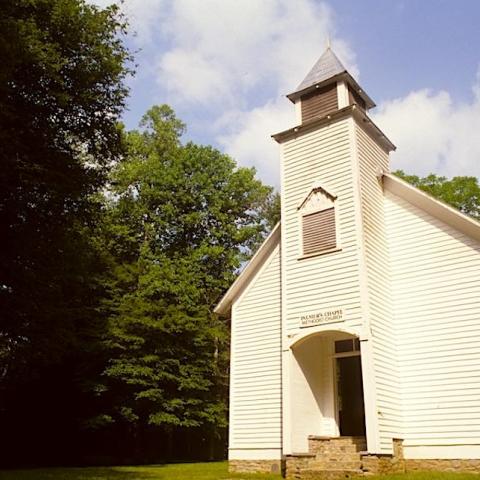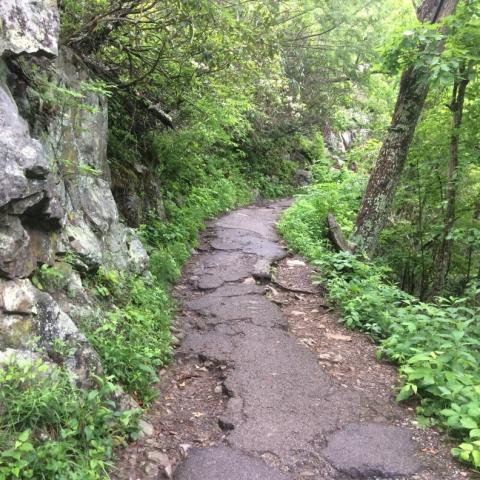
Wednesdays will be vehicle free on the 11-mile loop around Cades Cove in Great Smoky Mountains National Park/NPS file
Negotiating Cades Cove in Great Smoky Mountains National Park without cars? Yes, you'll be able to do that beginning June 17 and every Wednesday thereafter through September 30 as part of a pilot program testing ways to improve your experience in the park.
The park proposed the study due to congested parking areas and disruption of visitor services associated with the vehicle-free periods on Wednesday and Saturday mornings during the summer months that have been in effect for several years.
As part of the public planning process, park officials received feedback from 2,278 individuals from 37 states during the comment period back in March. More than 60 percent of the comments were supportive of the trial change, while 20 percent opposed the proposal. About 15 percent of the comments expressed a desire for the Saturday morning closures to continue, but most of these individuals also supported a full-day closure on Wednesdays.
Several respondents expressed additional concerns, including 8 percent of comments requesting consideration of a shuttle operation, 4 percent of comments noting concerns about limiting access for people with disabilities during the vehicle-free days, and a variety of other suggestions regarding congestion, safety, and descendant access.
The park began collecting data on visitor use during vehicle-free time periods in 1995. Over the last 25 years, use has continued to increase with up to 1,100 people a day cycling or walking along the 11-mile-loop during the 3-hour closure time period. This increased use resulted in several challenges including congestion, lack of parking, and disruption in campground and picnic area operations.
During the morning closures, access to the campground, picnic area, horse concession operation, campground store, and hiking/equestrian trails is blocked to accommodate parking for the biking/pedestrian opportunity on the Loop Road. As a result, traffic leading to the Cades Cove area is often gridlocked by a line of motorists waiting for the Loop Road to open at 10 a.m.
Park officials have incorporated feedback from the planning process into a monitoring program to assess the effectiveness of the trial in improving safety and the visitor experience for multiple user groups. By closing the roadway for the entire day, bicyclists and pedestrians will have over 12 hours of daylight to use the Loop Road without vehicles.
By spreading use throughout the day, parking should be more available with less impacts to campground, picnic area, and concession operations. By eliminating the Saturday morning closures, more motorists will have access to the Cades Cove area for these services along with scenic driving on what is traditionally the busiest day of the week for travel in the area. In addition, park staff and volunteers will be able to better support visitor programs on Wednesdays and Saturdays instead of devoting all personnel to traffic management and parking.
The results of the pilot study will be evaluated by park management to inform future planning. Vehicle access will continue to be provided seven days a week, October through April, and six days a week during the trial period, June through September, providing ample opportunities for park descendants and visitors to enjoy Cades Cove. Mobility-assisted devices are welcomed during vehicle-free days on the Cades Cove Loop Road for individuals with disabilities. If visitors need accommodation to safely access Cades Cove on designated vehicle-free days, they should call 865-448-4105 for more information in advance of their visit.




 Support Essential Coverage of Essential Places
Support Essential Coverage of Essential Places







Comments
Yes!!! About time, we walkers and riders had the same privileges.
Danny
www.hikertohiker.com
Yes And thank you. We're about To go there and we were concerned about the short time slot offered on Wednesday to bike Cade's cove. How to rent bikes and complete trail in such short time? Thank you for expanding to all day Wednesday bike accessibility.
Expansion of the hours for biking makes sense, and we look forward to biking there. National Parks are places for people to connect with nature. When we let our parks become too car-centric, we start turning the parks into a place to sight see by looking out the window, as opposed to getting out of our car to hear the birds and the wind in the trees. I support more pilots like this. Way to go U.S. Parks Service.